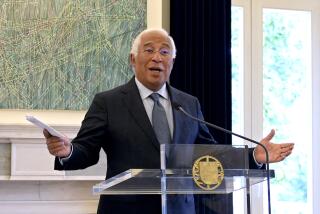Brazil Finance Chief Quits in Policy Dispute : Culminates Four-Month Fight Over Austerity
- Share via
RIO DE JANEIRO — Brazilian Finance Minister Francisco Dornelles, who advocated massive budget cuts and tight-money policies to fight Brazil’s runaway inflation, resigned Monday.
The resignation was sparked by President Jose Sarney’s firing of Dornelles’ deputy last week while the finance minister was out of the country. But the resignation is the culmination of a four-month struggle over domestic economic policy that pitted Dornelles’ tight-fisted views with the less restrictive approach of Planning Minister Joao Sayad.
Brazilian and foreign sources said that, while the Dornelles resignation appears to give Sayad a victory, accelerating inflation eventually could force Sarney to take the kinds of measures advocated by Dornelles.
Cabinet Members
Dornelles and Sayad were members of the Cabinet put together by President-elect Tancredo Neves, who became ill on the eve of his inauguration in March and died a month later without having been sworn in as Brazil’s first civilian leader since 1964.
Sarney, whose political base was non-existent, endured the internal battling among his economic team in large part because of difficulty in finding ministers that were acceptable to the center-left Brazilian Democratic Movement party of Neves as well as the other parties in the ruling coalition.
Dornelles’ resignation came less than a week after he and central bank President Antonio Carlos Lemgruber negotiated a 140-day extension of Brazilian foreign debt payments that are due soon. Brazil, the developing world’s largest debtor, owes more than $100 billion to foreign banks, governments and multilateral institutions.
Lending Cut Off
In February, the International Monetary Fund cut off lending to Brazil because the military government failed repeatedly to comply with the anti-inflation targets that it had agreed to meet. The IMF cutoff scuttled negotiations with foreign banks over a 16-year extension of Brazil’s maturing bank debts.
Sources said that Lemgruber and other officials of the central bank and the finance ministry also have submitted their resignations.
Dornelles’ resignation threw at least a temporary scare into the business and financial community. The stock market fell on the announcement and the dollar rose on the parallel currency exchange market, where Brazilians buy dollars to protect themselves against inflation.
But bankers and officials of the foreign community said that, although Dornelles’ resignation is a short-term victory for Sayad and his more gradual approach to trimming inflation, the realities of Brazil’s economy mean that there likely will be little change in overall policy.
Price controls held inflation to about 8% a month in the spring and early summer, but prices are expected to rise 13% this month and next, with the annual inflation rate about 217%.
“They may want to loosen monetary policy, but they won’t be able to in an environment of accelerating inflation,” said one top executive of a Brazilian bank.
On Friday, Sarney fired acting Finance Minister Sebastiao Marcos Vital after his highly critical remarks to a group of bankers were leaked to the Jornal do Brasil, Rio de Janeiro’s leading daily newspaper.
Vital told the bankers that the Finance Ministry had exhausted its part in an attempt to correct economic conditions and that the budgetary waste continued to feed inflation. He said political, not economic, decisions were damaging to the country. Vital had been a Neves loyalist.
More to Read
Sign up for Essential California
The most important California stories and recommendations in your inbox every morning.
You may occasionally receive promotional content from the Los Angeles Times.












